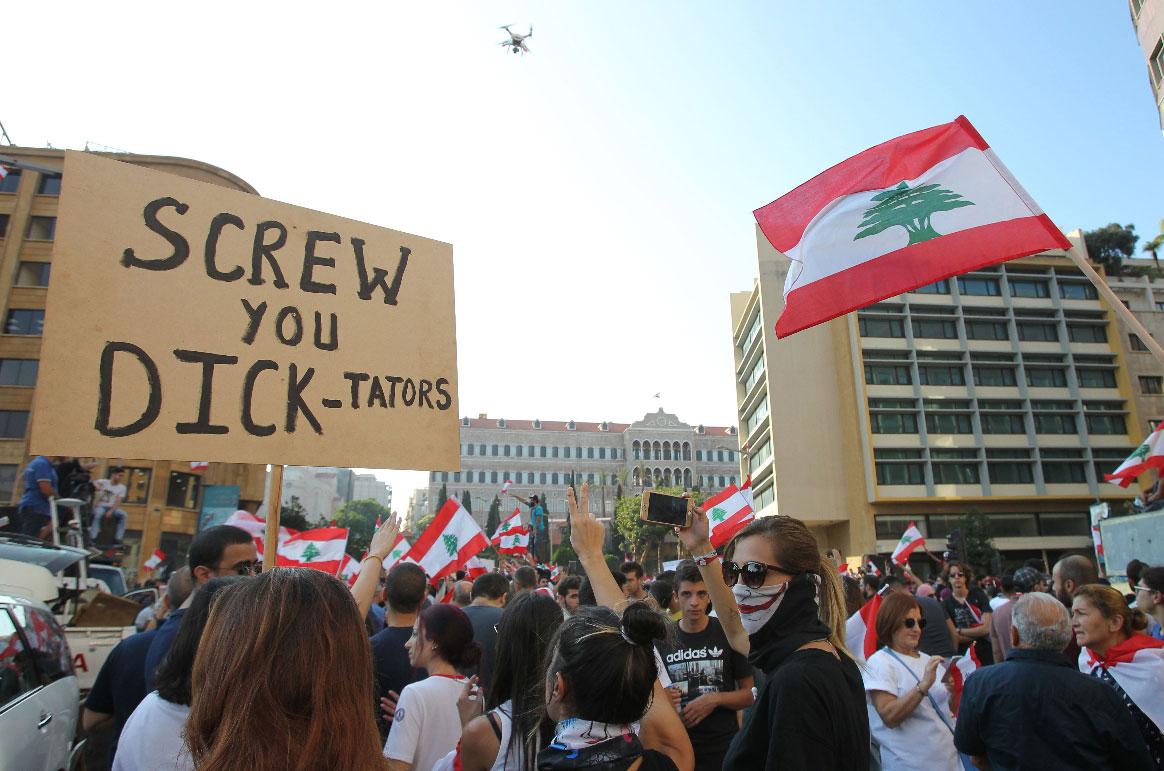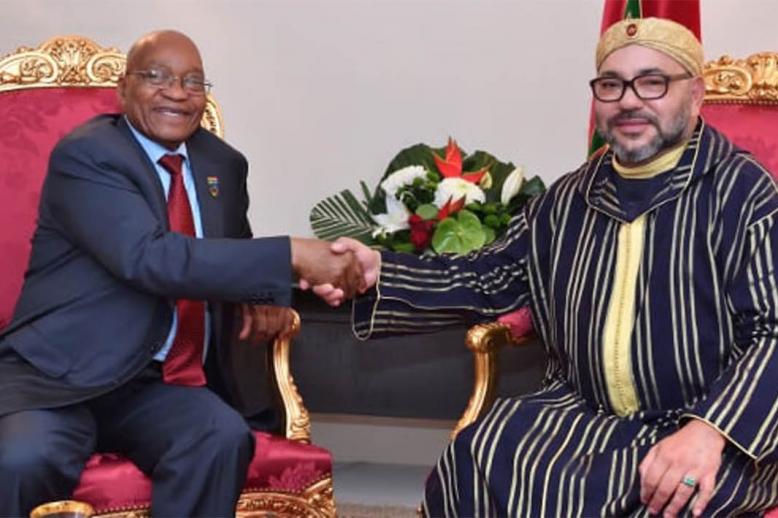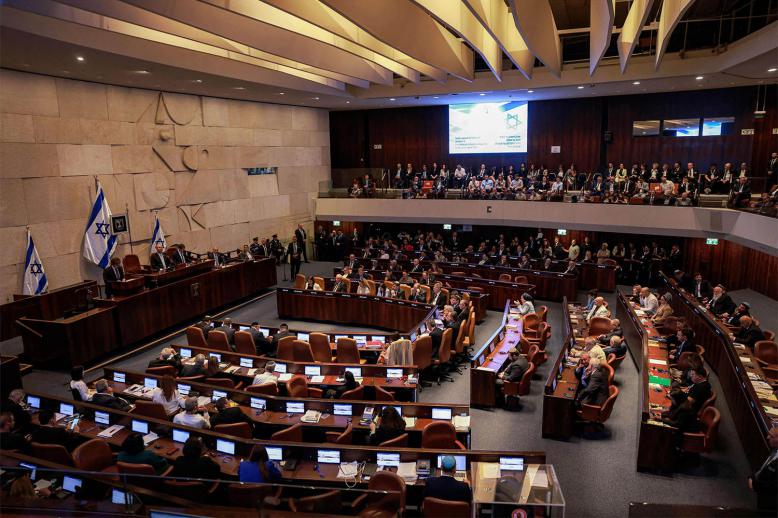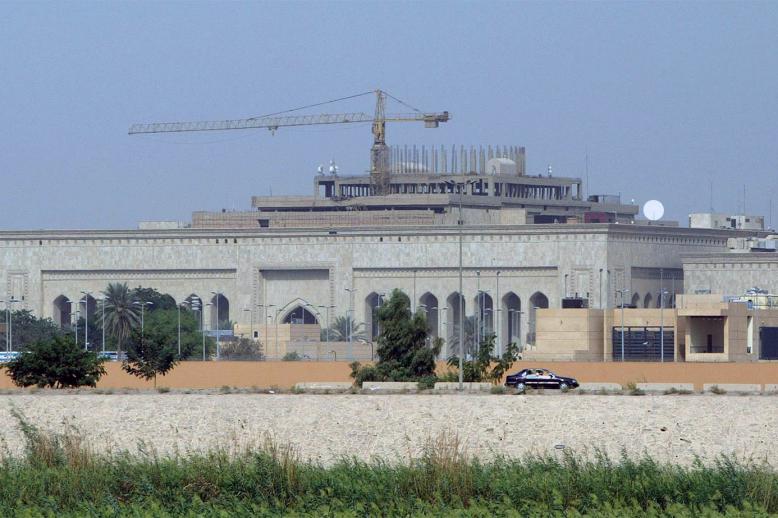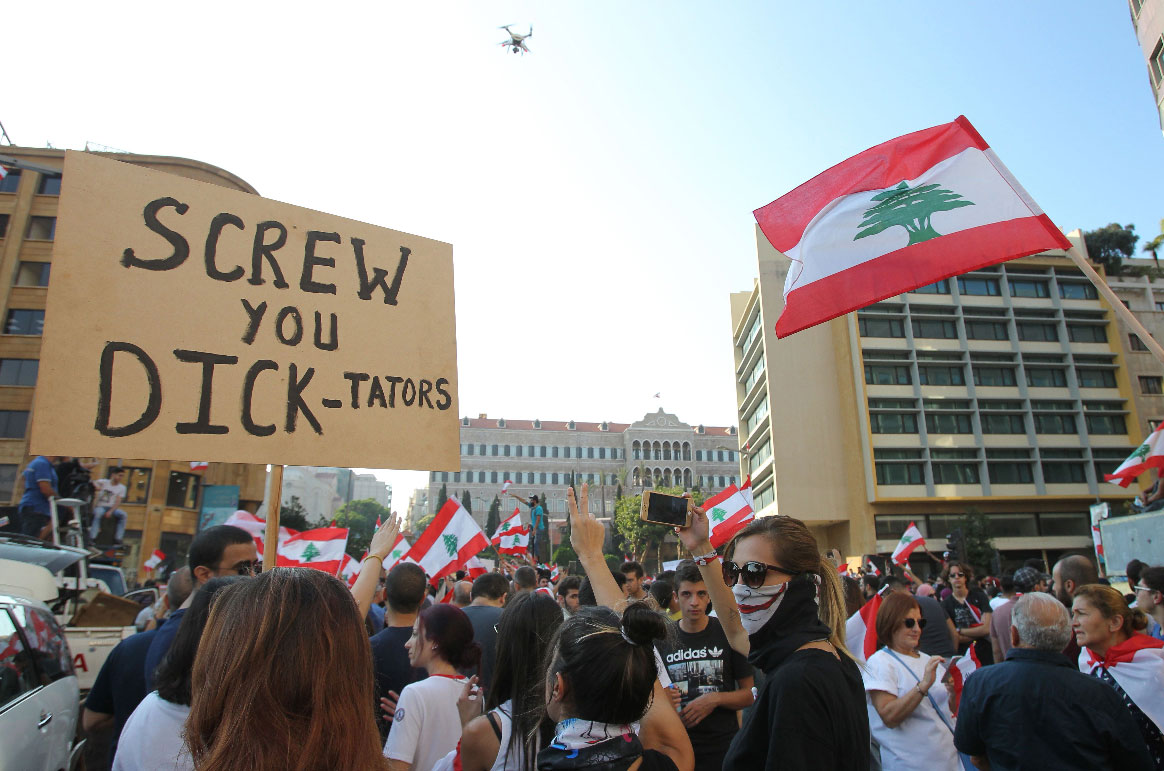Lebanon remains paralysed as protesters target barons
BEIRUT - Security forces are trying to persuade protesters to reopen roads across Lebanon through peaceful means but will not use force if they refuse, a security source said on Tuesday as the country remained paralysed by anti-government demonstrations.
Aiming to defuse anger at the political elite and dire economic conditions, the government led by Prime Minister Saad al-Hariri announced a set of measures on Monday including long-delayed reforms he said aimed to fight corruption and waste.
Hundreds of thousands of people have flooded streets across Lebanon since Thursday, furious at a hereditary political class they accuse of pushing the economy to the point of collapse.
Banks and schools remained shut on Tuesday. Early in the morning, the number of protesters in central Beirut and the northern city of Tripoli appeared smaller than on previous days.
Investors said the turmoil showed Lebanon was running out of time to fix its economic problems. The country has one of the heaviest public debt burdens in the world.
The protests have been overwhelmingly peaceful since Friday evening when some demonstrators clashed with the security forces in central Beirut.
Late on Monday, soldiers skirmished in Beirut with young men on motorcycles holding the flags of the powerful Shiite movements Hezbollah and Amal. Both parties denied any role.
The protesters have been blocking highways as part of the countrywide demonstrations which have united Lebanese from across the sectarian spectrum and have not been led by any of the parties that have long dominated politics.
Some main roads had reopened on Tuesday but they remained blocked in some areas.
The security source would seek to convince protesters on the need to open main roads.
"If they are convinced, so be it, if they are not the roads will remain closed," the source said. Some roads had been reopened in the south, the source added.
"We will not clash with the protesters and make a problem on the ground," the source said.
The reforms announced by Hariri on Monday included the symbolic halving of the salaries of ministers and lawmakers, as well as moves towards implementing long-delayed measures vital to putting the public finances on a sustainable path.
Political barons
Lebanon has one of the world's highest levels of government debt as a share of economic output. The government includes most major parties, run by politicians widely perceived to have mobilised state resources and influence for their own gain.
Hariri, the son of former Lebanese Prime Minister Rafiq Hariri, has cast himself as a champion of economic reform held hostage by unwilling coalition partners.
But Hariri himself is the scion of an influential Sunni family with links to the government in Saudi Arabia. Protesters have pilloried Hariri as a hypocrite and pure product of Lebanon's hereditary politics. They are demanding the complete renewal of the country's political class, whose main figures haven't changed in decades.
Hariri's image was further tarnished last month when reports surfaced that he had sent $16 million dollars to a South African model, even as his family group's employees were being laid off or worked unpaid.
The protests have been extraordinary because of their size and geographic reach in a country where political movements are normally divided on sectarian lines and struggle to draw nationwide appeal.
Since the 1989 Taif agreement that brought to an end the 15-year civil war and defined the rules of a sectarian-based power-sharing system, the same politicians, or their relatives, have called most of the shots.
They have long seemed untouchable but their future is now in the balance, with protesters vowing they will not relent until all the country's political barons are out of the picture.
Among the most targeted figures at protests have been parliament speaker Nabih Berri. He leads the Amal movement, which was one of the main militias in Lebanon's civil war. A former warlord, he has remained one of Syria's main allies in Lebanon.
His critics accuse him of having abused his position to amass a colossal personal fortune and protesters in recent days bashed him and his wife Randa as some of the most egregious examples of Lebanon's patronage system.
Video spread online has shown militants affiliated with Berri's Amal movement attempting to intimidate protesters.
Arguably the most reviled leader among the protesters is the current foreign minister Gebran Bassil. Bassil is the son of Michel Aoun, 84, who was elected in 2016 as the 13th president of Lebanon.
Aoun, a Maronite Christian, once championed opposition to the Syrian occupation of Lebanon and launched an ill-fated "war of liberation" in 1989.
Forced into French exile by Syria, he eventually returned in 2005, after the withdrawal of Syrian forces, and became president after a spectacular shift of alliances earned him the support of his erstwhile arch-foes.
Once a vocal critic of nepotism, he managed to secure a ministerial portfolio for his son-in-law Bassil and made him the leader of his party. Protesters on the streets have not spared Bassil in often explicit slogans.
Other significant figures that have drawn the ire of protesters include:
- Walid Joumblatt (a towering figure in Lebanon's Druze minority who "passed on" his parliament seat to his son Taymour last year)
- Samir Geagea and Sleiman Frangieh (Frangieh had accused Geagea of complicity in his family's murder during the Civil War, but the two Christian leaders have since reconciled)
- Sami Gemayel (representative of the powerful Gemayel dynasty and leader of the Christian Kataeb party, his cousin Nadim is also an MP)
The economy has been hit by political paralysis and regional conflicts, compounded by strains in the financial system that have risen as inward capital flows have slowed. Unemployment among the under 35s runs at 37%.
'All of them means all of them'
One significant taboo was broken during the protests when strongholds of Hezbollah saw rare demonstrations, criticising both the party and its revered leader Hassan Nasrallah.
On live TV and in protest sites, citizens accused the party of providing political cover for corruption in the government. This has shattered the myth of absolute acquiesence among Hezbollah's popular base, baffling even those who hail from the movement's strongholds.
"No one ever expected that in any of these areas in south Lebanon we would hear a single word against Nasrallah," or Amal leader Berri, said Sara, a 32-year-old activist who participated in protests in the southern city of Nabatiyeh.
"It's unbelievable," the activist added, asking to use a pseudonym due to security concerns.
South Lebanon has been a bastion of the powerful Shiite movement since the group helped liberate the region from Israeli occupation in 2000. But protests have been reported in the cities of Nabatiyeh, Bint Jbeil, and Tyre, where Hezbollah and its political affiliate Amal hold sway.
With the exception of Tyre, the protests in Southern Lebanon were not as big as other parts of the country.
But "the novelty here is that some of these protesters are party loyalists," said Sara. "They support Hezbollah, but they are suffocating."
The popular, Iran-backed Hezbollah has been steadily growing as a major political player. It took 13 seats in the country's May 2018 parliamentary elections and secured three cabinet posts. It is the only political party not to have disarmed after Lebanon's 1975-1990 civil war, and helped its Christian ally Aoun assume the presidency in 2016.
Among his supporters, Nasrallah is revered as an icon, with his pictures inundating highways, shops and homes. In the past, his followers have mobilised against anyone who tried to criticise him, often ostracising opponents as supporters of rival Israel.
But the anti-government protests have left no politician unscathed.
"All of them means all of them, Nasrallah is one of them," protesters chanted in Beirut.
Criticism of Nasrallah even aired on the Hezbollah-run Al-Manar TV, in a scene that was previously unfathomable for watchers of the movement's propaganda arm.
In a live interview from central Beirut, one protester urged Nasrallah to "look after his people in Lebanon" instead of focusing on regional enterprises like Syria, where he has deployed fighters to defend President Bashar al-Assad's regime.
Hatem Gharbeel, a protester in Nabatiyeh, said Hezbollah loyalists felt let down.
"The messages being addressed to Nasrallah by his own supporters in Nabatiyeh is that the resistance is not just about fighting Israel or terrorism," he said. "It should also be about supporting people's livelihoods."
Lokman Slim, an independent political activist and an outspoken critic of Hezbollah, said that resentment among Lebanon's Shiite community "is not born out of a single event or a single moment."
"Frustration has been fermenting over the past few years over an economic crisis hampering not just the Lebanese state but also Hezbollah's statelet."
Hezbollah has filled in for the weak central government in areas where it has influence, creating social welfare institutions and provided an array of public services, including education and health services.
But the group has come under financial strain due to tightening US sanctions since President Donald Trump assumed office, forcing Nasrallah to appeal to his popular base for donations earlier this year.
"The Shiites have nothing to lose anymore," said Slim. "This is why they are out on the streets."

